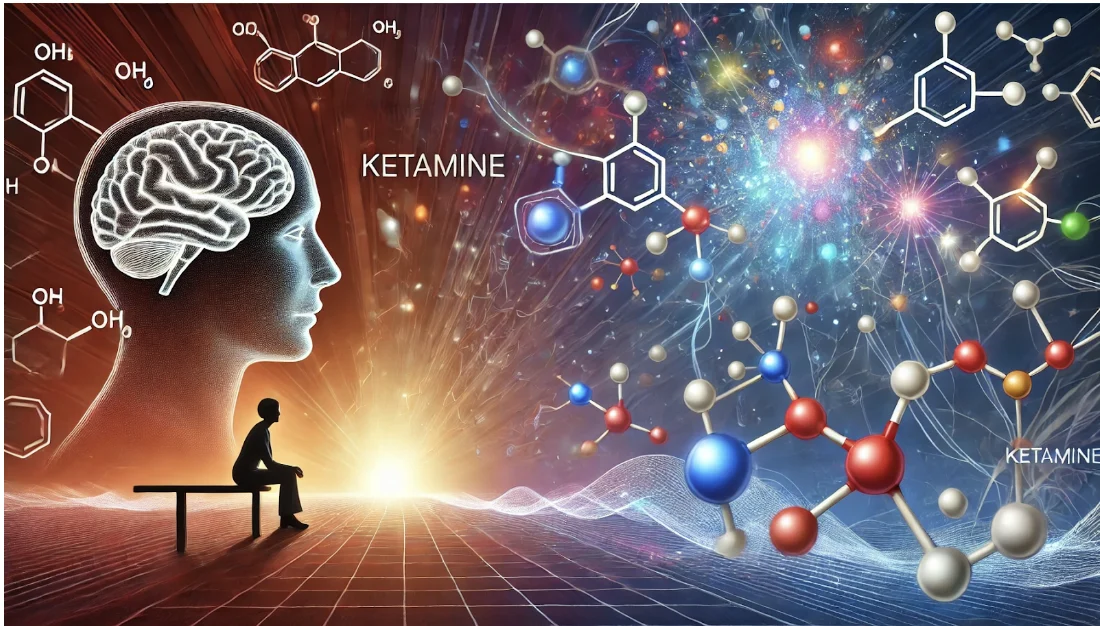A complex and widespread mental health condition that affects millions of people worldwide is depression. Traditional treatments like SSRIs (Selective Serotonin Reuptake Inhibitors) often take weeks to show results and don’t work for everyone. Enter ketamine—a drug initially used as an anesthetic but now showing promise in rapid depression relief. But how does ketamine impact the brain, and what are the implications for its repeated use in treating depression? This blog explores the fascinating world of ketamine’s impact on brain rewiring, its potential benefits, and considerations for future treatments.
Understanding Ketamine: A Brief Overview
Ketamine, a dissociative anesthetic, has been utilized in medical settings since the 1960s. Its ability to induce a trance-like state while providing pain relief and sedation made it a valuable tool in surgery and trauma care. However, its potential as a rapid-acting antidepressant has only been recognized in recent years.
How Ketamine Rewires the Brain
Synaptic Plasticity: The Foundation of Brain-Rewiring
The brain’s ability to adapt and reorganize itself by forming new neural connections is known as synaptic plasticity. Learning, memory, and brain injury recovery all depend on this process. Research indicates that ketamine enhances synaptic plasticity, which may contribute to its rapid antidepressant effects.
Ketamine and Glutamate: A Crucial Interaction
Ketamine mainly acts via modifying glutamate, a neurotransmitter that is essential for synaptic development. By blocking NMDA (N-methyl-D-aspartate) receptors, ketamine increases the availability of glutamate in the synaptic cleft. This surge in glutamate activates AMPA (α-amino-3-hydroxy-5-methyl-4-isoxazolepropionic acid) receptors, leading to a cascade of events that strengthen synaptic connections and enhance brain plasticity.
Brain-Derived Neurotrophic Factor (BDNF): A Key Player
A protein called BDNF promotes the development of new synapses and neurons while assisting in the survival of existing ones. Studies have shown that ketamine increases the levels of BDNF in the brain, which may further facilitate the rewiring process. This increase in BDNF is thought to be one of the mechanisms behind ketamine’s rapid and sustained antidepressant effects.
The Promise and Pitfalls of Repeated Ketamine Use
The Benefits of Repeated Ketamine Administration
Repeated administration of ketamine has been shown to sustain its antidepressant effects. This is particularly beneficial for patients with treatment-resistant depression who have not responded to traditional therapies. By promoting ongoing synaptic plasticity, repeated ketamine use may help maintain the brain’s rewired state, providing longer-term relief from depressive symptoms.
Potential Risks and Side Effects
Despite its promise, repeated ketamine use is not without risks. Common side effects include dissociation, hallucinations, and increased blood pressure. Long-term use may also lead to cognitive deficits and potential addiction. Therefore, it is crucial to balance the benefits of ketamine’s brain-rewiring capabilities with its potential side effects.
Alternative Strategies for Brain Rewiring in Depression
Combining Ketamine with Psychotherapy
One promising approach is combining ketamine treatment with psychotherapy. The enhanced brain plasticity induced by ketamine may make patients more receptive to therapeutic interventions, potentially leading to more significant and lasting improvements in mental health.
Exploring Non-Drug Interventions
While ketamine shows great promise, non-drug interventions that promote brain plasticity should not be overlooked. Techniques such as transcranial magnetic stimulation (TMS), electroconvulsive therapy (ECT), and even lifestyle changes like exercise and mindfulness meditation can also enhance synaptic plasticity and support brain rewiring.
Practical Steps for Safe Ketamine Use
If you are considering ketamine treatment for depression, here are some practical steps to ensure its safe and effective use:
- Consult a Specialist: Seek out a healthcare provider experienced in administering ketamine for depression. They can help determine if this treatment is appropriate for you and monitor for potential side effects.
- Combine with Therapy: Consider integrating ketamine treatment with psychotherapy to maximize its benefits and support long-term mental health.
- Monitor and Adjust: Regular follow-ups with your healthcare provider are essential to monitor your response to treatment and make any necessary adjustments.
- Be Mindful of Side Effects: Stay informed about the potential side effects of ketamine and report any adverse reactions to your healthcare provider promptly.
Ketamine’s ability to rewire the brain offers a promising avenue for treating depression, especially for those who have not found relief with traditional therapies. By enhancing synaptic plasticity and promoting the growth of new neural connections, ketamine can provide rapid and sustained antidepressant effects. However, its use must be carefully managed to balance the benefits with potential risks. Combining ketamine treatment with psychotherapy and exploring non-drug interventions can further enhance its effectiveness and support long-term mental health.
If you or someone you know is struggling with depression, consider consulting a healthcare provider at our clinic to explore whether ketamine treatment might be a viable option. With ongoing research and a careful approach, ketamine could represent a significant breakthrough in depression treatment, offering hope to many.



